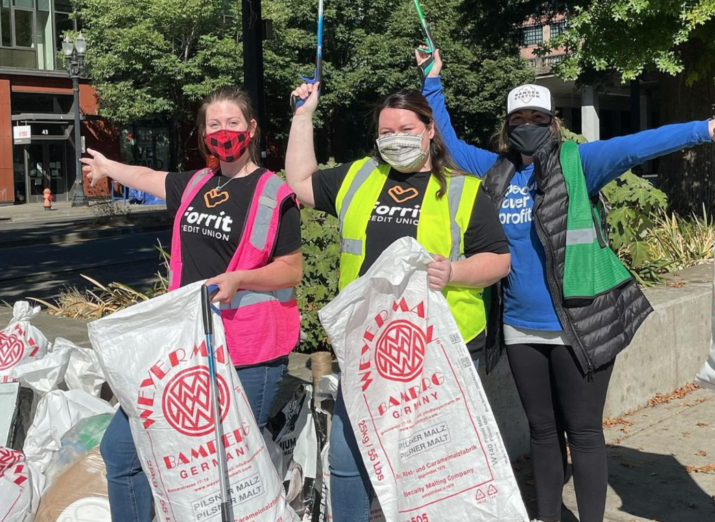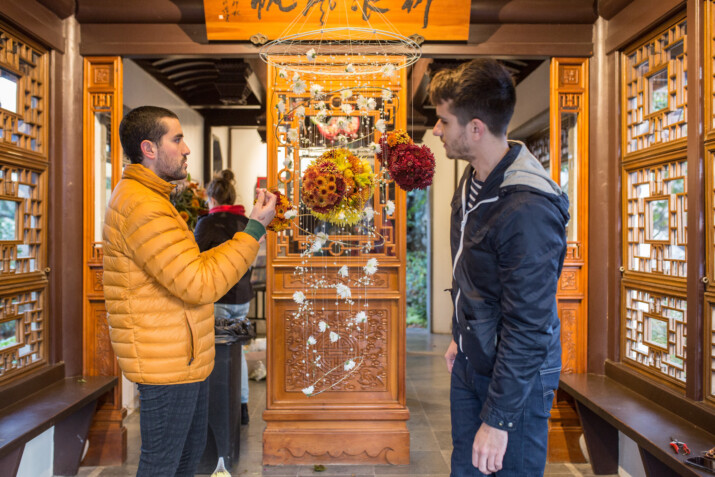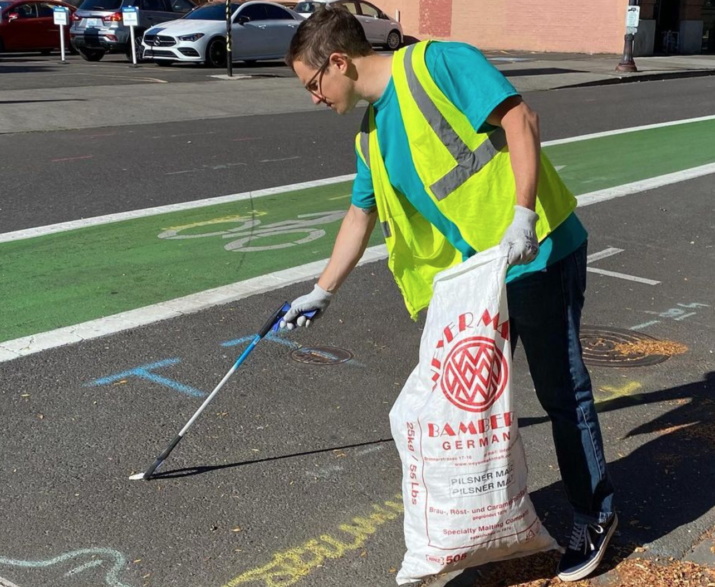
Volunteers collected large items like couches, pieces of furniture, and car tires, as well as small pieces of litter like bottle caps, cigarette butts, and plastic bottles.
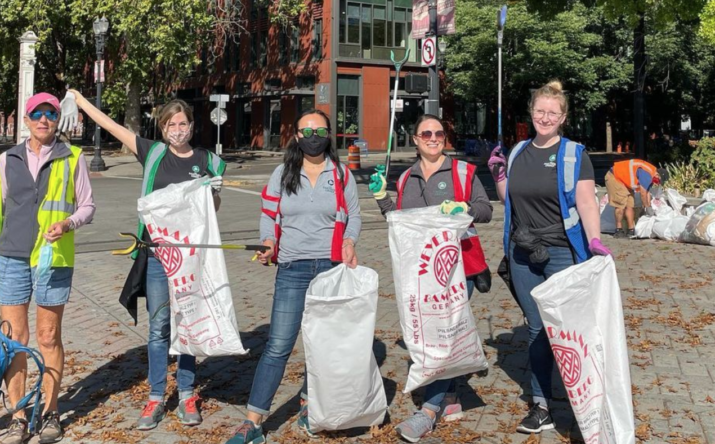
SOLVE’s state-wide programs have held 571 events, empowering 12,193 volunteers who removed 113,226 lbs. of trash, planted 13,748 native trees and shrubs, and removed 180,929 sq. ft. of invasive plants in the last 12 months alone.
In addition to monthly clean-up efforts, SOLVE has weekly ‘Detrash Portland’ events. They connect like-minded volunteers who want to tackle the issue of litter in Portland. Each week, SOLVE supports events throughout the city; it provides cleanup supplies, safety information, and disposal assistance for anyone who would like to improve their neighborhood through the simple act of cleaning up.
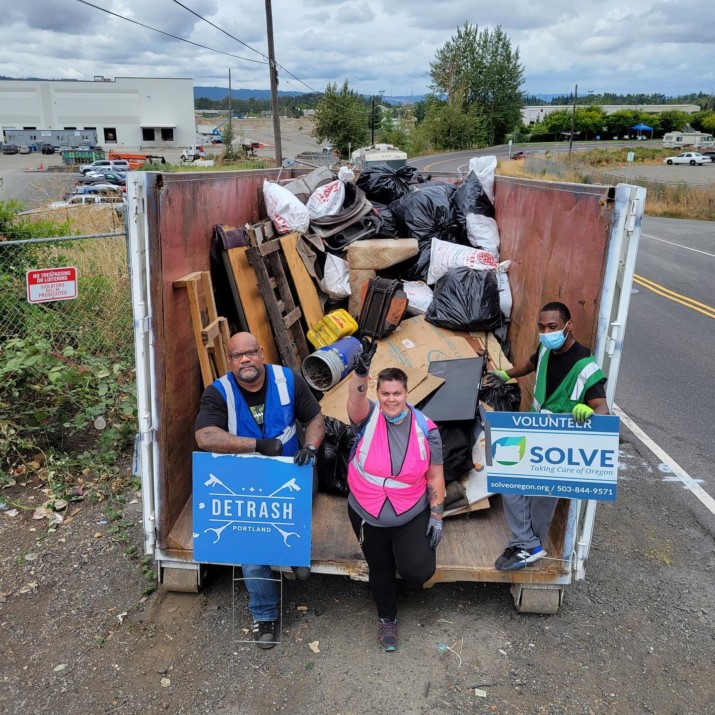
From SOLVE, “We take pride in Portland and know that cleaning up is an easy and effective way to give back. Join us at an upcoming event and become a part of the Detrash Portland movement! “
If you’re interested in volunteering with SOLVE here’s a link to upcoming events.
For example, Tillamook County volunteers are wanted for SOLVE’s Beach & Riverside Cleanup, in partnership with the Oregon Lottery, on Saturday, September 25. Projects will include cleanup in Netarts Bay, Rockaway Beach, and Pacific City.
Part of the mission of SOLVE is to educate people about the importance of cleaning up the environment.
SOLVE’s list of learning opportunities: (Most of these opportunities are for high school level readers and above, and cover a variety of environmental topics.)
https://www.edx.org/ – Edx offers a multitude of classes from some of the world’s top universities. Enrolling into a class is free, although you will have to make an account with the website. Options to accredit your online class are available too.
https://www.futurelearn.com/subjects/nature-and-environment-courses – Similar to Edx, FutureLearn connects users to hundreds of online learning opportunities. Classes are free, but you will have to register on the site.
http://conservationwebinars.net/ Conservation is an ever-changing subject, so to keep the science community up to speed, the USDA created a free webinar portal as a part of their Science and Technology Training Library. Webinars vary from being “live” to on-demand.
http://www.forestrywebinars.net/webinars – Brought to you by the National Center for Sustainable Resources.
https://extension.oregonstate.edu/union/events/forests-northern-blues-basic-forestry-webinar-series – A six-part series on basic forestry, brought to you by Oregon State’s Extension Services. The webinars come weekly and are already underway! Click to catch the second half of the class.
https://extension.oregonstate.edu/mg/linn-benton/events/webinar-what-can-leaf-bud-tell-us-about-environmental-change – A 60-minute webinar perfect for this time of year: What can a leaf bud tell us about environmental change?
A focus on Plastic Pollution:
https://www.youtube.com/watch?v=ggh0Ptk3VGE – Plastics 101. SOLVE is committed to cleaning our communities and natural landscapes, including Oregon’s beaches, from plastic pollution and other litter. Take a moment to watch National Geographic’s Plastic: 101 video to get acquainted with this material.
https://www.youtube.com/watch?v=uP9Tcf0CaV0 – Learn more about where your trash goes in this short video about modern landfill management.
For the kids:
Make screen time more valuable! Use this list below to access online resources to keep your child engaged in science and the natural world from home. Do a quick Google search and you’ll find many resources available. Below are just a few that we found particularly interesting.
https://classroommagazines.scholastic.com/support/learnathome.html – Kudos to Scholastic for being extremely versatile and opening up their online platform to learning opportunities for kids of all ages!
https://rangerrick.org/stuck-indoors/ – Join Ranger Rick on journeys throughout the natural world! The Wildlife Federation is making all Ranger Rick website activities and online magazines free for the next few months.
http://www.sciencekids.co.nz/gamesactivities.html – An all-encompassing science activities site from New Zealand.
https://pbskids.org/games/science/ – Interactive science-based games from PBS.
https://www.khanacademy.org/ – Khan Academy is stepping up their game, making their online resources more available than ever before. They have also created a learning schedule, that students can log into and experience real-time instruction, to provide some structure to your child’s day at home.
https://www.science-sparks.com/pine-cone-weather-station/
https://citynaturechallenge.org/ – Become a citizen scientist between April 24 – April 27 and help document the biodiversity in your neighborhood. This is a global effort.
From SOLVE:
Founded in 1969, SOLVE’s mission is to bring Oregonians together to improve our environment and build a legacy of stewardship.
SOLVE restores and preserves Oregon’s environment by mobilizing the power of volunteers and partners with the generosity of donors. Across the state, we bring diverse communities together to improve the health and safety of our neighborhoods and natural areas including our coast, rivers, parks, and forests.
- We implement litter cleanups because we know the importance of keeping our neighborhoods safe and healthy, while also understanding the importance of picking up litter before it heads downstream, impacting our shared ocean.
- We orchestrate year-round beach cleanups because we know they are essential to reducing the harmful effects of plastic pollution and other marine debris.
- We plant native trees and shrubs and remove invasive species to help Oregon’s habitats stay healthy, so they can continue to support a wealth of pollinators and other wildlife.


